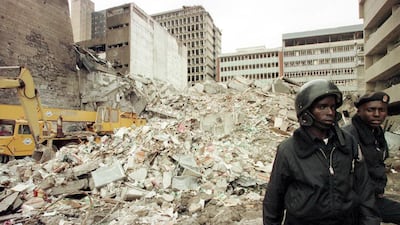Secretary of State Antony Blinken marked the 25th anniversary of the US embassy bombings in Kenya and Tanzania with a commitment to the families of those lost to remember their stories and to push for safer embassies around the world.
On August 7, 1998, two lorries arrived nearly simultaneously at the US embassies in Nairobi and Dar es Salaam, setting off massive explosions that killed more than 200 people, including 12 Americans, and injuring thousands more.
In many ways, the attacks, later linked to Al Qaeda, were a precursor to the events of September 11, 2001, and America's decades-long war on terror.
At the time, Osama bin Laden and Al Qaeda were not part of the world’s lexicon. Following the bombings and the massive FBI investigation into them, that started change.
The US continues to root out those linked to the 1998 attacks and the terror group. Last year, the US military killed Ayman Al Zawahiri, the head of Al Qaeda and mastermind behind the bombings, in a drone strike in Kabul, Afghanistan.
The impact of the 1998 bombings continues to be felt in myriad ways. They altered, for example, the way the State Department designed and built embassies going forward, with a renewed emphasis on safety and security.
Washington also beefed up its designs and enforced a 30-metre setback rule, which mandates embassies be at least 30 metres back from the road.
“We have a lot of work still to do. But after the bombings, we worked with Congress to invest almost one and a half billion dollars every year to build more secure embassy facilities,” said Mr Blinken, who marked the anniversary with a moment of silence.
“We also partnered with Congress on legislation that required new protections like the 100-foot setbacks, high perimeter walls and access control for visitors.”

The embassies that replaced the destroyed ones in Kenya and Tanzania are fortresslike structures, encircled by huge security walls.
Two and a half decades later, Al Qaeda and its affiliates remain a destabilising force in parts of Africa.
This is particularly apparent in the Horn of Africa, where Al Shabab remains a fearsome force, and in the Sahel, where Jama'at Nusrat Ul Islam Wa Al Muslimin has waged a multiyear campaign against civilians, local security forces and international counter-terrorism troops.
“I can't think of a better way to honour the scars and sacrifices of that day than to carry forward the work that those we lost were engaged in, the work of diplomacy, the work of the United States, the work of connecting our country with other countries,” Mr Blinken said.


